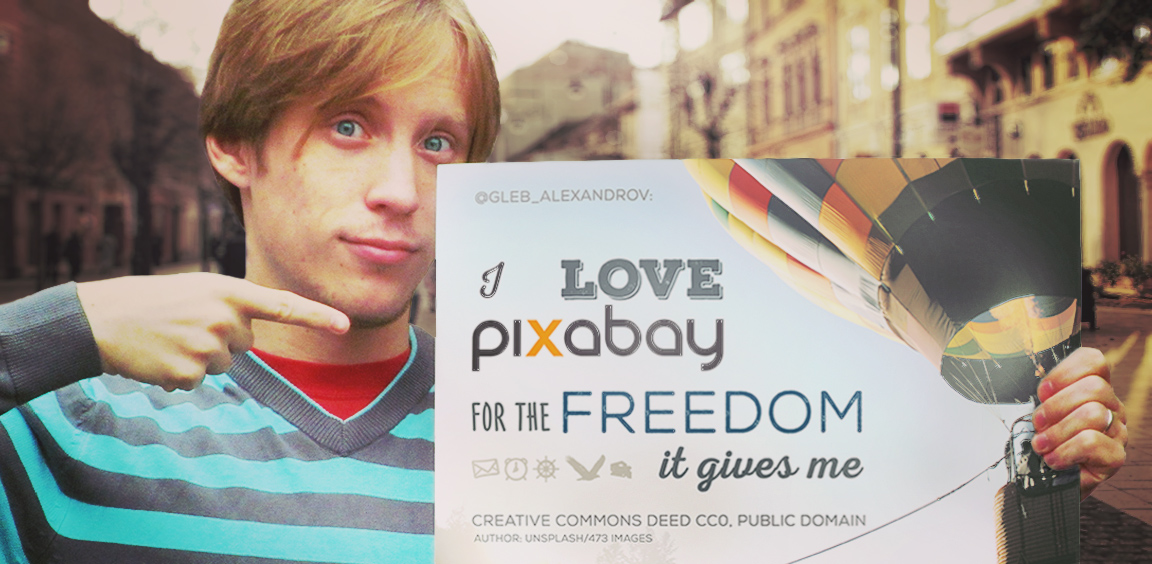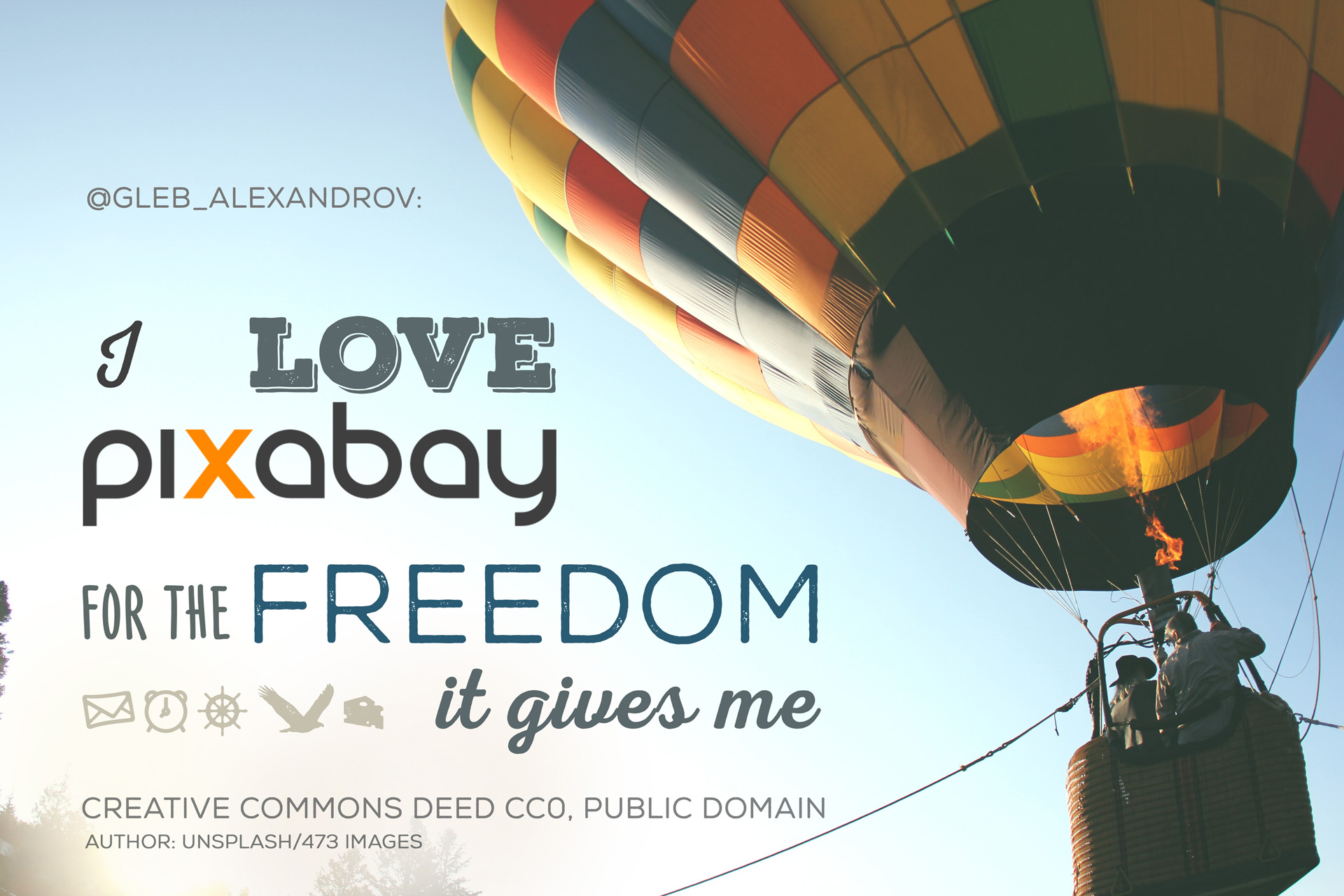I freaking love Pixabay for what it does for us, nerds, and our freedom. What I mean is its hassle-free Creative Commons Deed CC0 license, its cappuccino payments and its sheer stupefying awesomeness.
Call to Action: share these post on Twitter and Facebook now by clicking the button below the post, to make Pixabay even more popular.
Attribution Requirement in a ‘Free’ License: Why It Spoils The Fun?
Pixabay never requires attribution, but some other community-driven resources don’t provide pure CC 0 license.
To compare the licensing options on different free images resources, check 7 Cool Websites with Free Images and Textures.
Now I want to share some thoughts about it.
Imagine a pretty common situation in a daily 3d production: you need a bunch of textures. Chances are, some of them will be used to texture a trash can, that covers the screen area of 15×15 pixels. Or to serve as a layer #101 in some obscure material. Nevertheless, for each and every image that requires attribution you would need to go through cumbersome process of linking to the license page, mentioning if changes were made, etc.
No fun at all, if you ask me.
And NOW imagine a matte painting with crazy amount of layers. As for me, the need to make a correct attribution for 768 images sends chills down the spine!
And what is the point of permissive license, if in a real world production it cripples creativity as much as ‘all rights reserved’ license?
Returning to Pixabay: on this resource, no attribution is required ever. Still, you may credit the author of the image (and even but her a cappuccino!) but you are not enforced to do so. It’s a huge difference.
Jump in the Boat and Share Something on Pixabay!
Or just make a photo with you, holding this poster, or something 😉
In my point of view, the real free images sharing resource should work just like Pixabay does. And for that reason I want to encourage you to share something on Pixabay.
The view from your window. Your cat. Your smile, after all.
Now, If I had to make a statement regarding image licensing, I would have said something like this:
F#ck restrictive licenses, long live Pixabay.






Sebastián Andil
While I agree with your points about inconvenience of giving an attribution where it’s meaningless, I think the author of the photo you can use for free naturally deserves some attribution 🙂
C’mon! He/She spent some time making it, adjusting, uploading to the website you downloaded it from and so… That should be more of a natural process I guess giving an attribution… 🙂
Gleb Alexandrov
Sebastián, you are absolutely right! 🙂 I usually give attribution even if it’s not required.
But, when it’s no longer possible, or very time consuming and kills a creative impulse, I start to think about breaking the rules.
On Pixabay, that thing never strikes me, so the whole process of finding and using images is 356% more fluent.
Java
I agree, though I think that the original photographer deserves some credit. I mean, they spent time out of their day to take that picture. Its actually really lucky there’s such a thing as free photos.
Gleb Alexandrov
Thanks, Java. What I want to say is that attribution is okay, while it doesn’t hinder creative flow. And when it does, it’s no longer can be considered absolutely ‘free’. Even if technically it is. That’s why I think that Pixabay’s model of licensing is the best. We still can pay credit to the author, but we are NOT obliged to do so.
Steve
I totally love the Pixabay way of working. That is freedom. I found Pixabay thanks to you.
Imagining that we use dozens or even hundreds of photos and textures, to give the correct attribution to all of them, seams scary at first! to deconstruct our work and art in that way and make it public!
But that would be a total new mentality and the correct thing to do!
In matte painting and photobashing, the artists end up deconstructing and transforming the images into something else, totally new. But still we should mention the sources.
Copyright and licences are somehow a grey area.
Gleb Alexandrov
Heh, I wish I could possibly mention >200 images, with links and all that stuff. 🙂
Jeffrey Wilson
One thing is for sure its great to watch people in the blender world take both sides of this. I for one stand on this, I think every one in the ART, video game, movie, ect should give back inspiring bigger and better things improving the “world” However money puts food on the table there needs to be a fine balance between the two and I think “free” is starting to catch up but still needs work. Interesting post gleb, might be worth a “group” podcast with views from both sides. that would be a good “brain food” ep.
Gleb Alexandrov
Yep. Thanks, Jeff 🙂
Observation Time
Pixabay is all very nice but you do realise that your free images are being sold for real money on Alamy don’t you? And there’s NOTHING you can do about it because you’ve signed away your rights – you no longer own anything about that image. It’s like you never pressed the shutter. And someone else is making real cash as we speak – selling your images to businesses. Are you fine with that too? Get real. the stock industry is just taking advantage of your naivity and exploiting you for money.
Gleb Alexandrov
Thanks for your opinion. Indeed, selling Pixabay images to businesses sucks. But that doesn’t diminish the value of free sharing.
The stock industry is largely based on ‘copyright’, and this idea starts too look pretty archaic in today’s world. In my opinion, being naive is to think that the ideas of ‘author’ and ‘copyright’ should be the same in 19th and 21th centuries.
Opensource, community-driven projects, web 2.0, crowdsourcing, self-publishing – all these trends are based on free distribution of knowledge and content. And the media landscape is shifting towards these trends.
So I don’t worry if my images and tutorials are being exploited somewhere outside my website. Not every person is a dickhead, so at least we would enjoy some back links to our blogs, or whatever 🙂
Observation Time
No there are no backlinks, no attribution, no indication that you are the creator of the very fine shot. Nothing. The stock photographer is selling your work via a stock library as if they had shot it themselves. And it’s not going for cents either. Rights-Managed images can fetch hundreds (sometimes thousands) of dollars per use. That money is being split between the stock library and the stock photographer. You see absolutely nothing.
I don’t know what you do for a job? But I assume you don’t work for free. You have to eat and pay rent right? Even as a hobby you need to buy cameras, lenses and computers from time to time. I bet the stock photographer does. I bet he (or she) is laughing all the way to the bank off your hard work. Go and search the images of ‘FL Collection’ on the Alamy stock library site. See if any of yours are there. Look at the prices. You’re making it easy (and legal) for people to profit from your work (and they’re not dickheads, they are business people who have seen a loophole and are exploiting it).
Grey Shades
“Community” has and will always be exploited by capitalists and opportunists. You millenials have a lot to learn about reality.
Grey Shades
A voice of sanity! Thank you!!
Grey Shades
I’ll say going in that I am a social misfit. OK – So WHY would anyone put their creative works in the hands of thieves and abusers like Pixabay? I don’t care how loud you are denying it, you want to make money on your art. So, you just hand it over for the world to take and exploit. For what? A warm feeling? Pee yourself in dark colored pants and you get that. NO NO NO I will share where I maintain control and have options, or it will sit on my hard drive and no one but my closest friends will see. I may end up complete broke, but I’m not giving to the corporate crooks or the so called artist.
Grey Shades
Pixabay should be illegal, if only to protect those of diminished capacity who willing give their hard work and $$$$$ away for free.
Gleb Alexandrov
Grey Shades, maybe I didn’t get your irony, forgive me if that’s the case 🙂 People love giving hard work for free, when they feel that their contribution really matters and makes the internet a better place. Linux, Blender, Android, Firefox, WordPress (in a wider sense, the internet itself), all of these things are free and are being developed by people who love working for free.
Grey Shades
Your references are like saying United Way is truly a benevolent organization. Lots of people making lots of money there. Pixabay is deliberately burying convoluted legalese to lure in the gullible who do not intend to give there works so others can make money from them. Let me know when all of Pixabay’s employees give up their salaries becoming truly volunteers to make the internet a better. Because that is what you and they want me to do: Give away that which has taken a lifetime of experience, tens of thousands of dollars of equipment investment and a great deal of work to make the internet better. Turn off the internet. I liked the world better without it.
Gleb Alexandrov
Sure, turning off the internet has many benefits! 🙂 Just to add my 5 cents, I think that giving stuff for free and still getting paid for it is not mutually exclusive. I would say, it’s very beneficial to give stuff for free.
Grey Shades
Are you talking about that warm feeling you get or real benefits? Please, don’t talk in riddles. Come out and explain the benefits when your “gift” goes to buyers who have no idea who you are or how to patronize you.
Gleb Alexandrov
I’ll try to unpack what I’m talking about. Two things are important, imho:
1. Indirect benefit. Let’s say, you give away 50 photos to Pixabay or any website with public domain textures. You spent great deal of time, invested in the equipment, and so on. Now you invest in the ecosystem of freely available photos for concept artists, designers, vfx dudes, filmmakers and creative folks.
Multiply 50 photos by 100000 people who think just like you and are ready to invest into the ecosystem and ta-daaam. Chances are, the repository like this will help you to finish your project on time, earn more money etc. Smart crowd phenomenon.
2. Direct benefit. Not talking about Pixabay here, but rather some general string of thoughts. Say, Greg Zaal gives away ALL of his HDR images and makes them CC BY 0, and then people support him on Patreon. The thank you economy in action, win-win.
Grey Shades
If I believed if fairy dust, I might bite. A public domain “ecosystem” will always be raped and pillaged by the establishment. But, that aside for the purpose of indulging your uber optimistic fantasy of self sustaining art supported by actual for-profit entities. It will not help me finish on time because I refuse to incorporate others’ works into mine. Seems like fraud (A LOT!). If I need a background or some other element and leverage work that is not mine, I must give them credit and compensation and then the piece becomes virtually worthless because I did not create it in whole, I pieced it together and have a community piece of junk. Also, and more fundamental to the issue, Pixabay disallows an identity that would actually let a commercial or private entity from knowing how to get in touch with me to purchase my work or hire me to create other works. Their focus is on profit, as it should be. They should just be up front about it.
Pingback: Https://www.pixabay.com | WachatApp